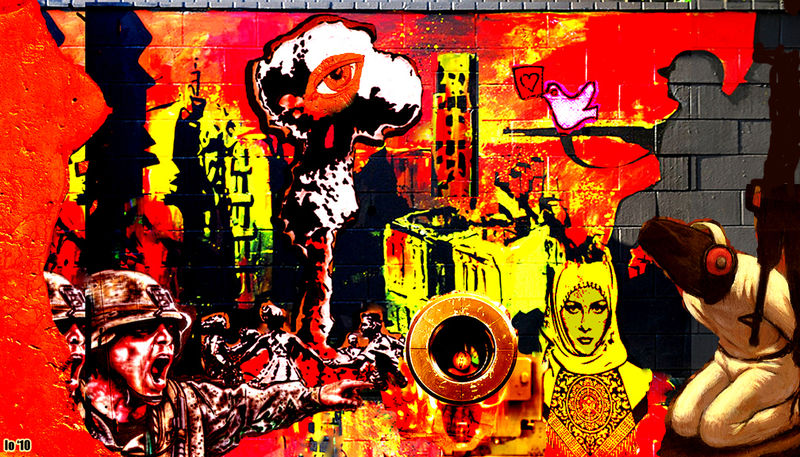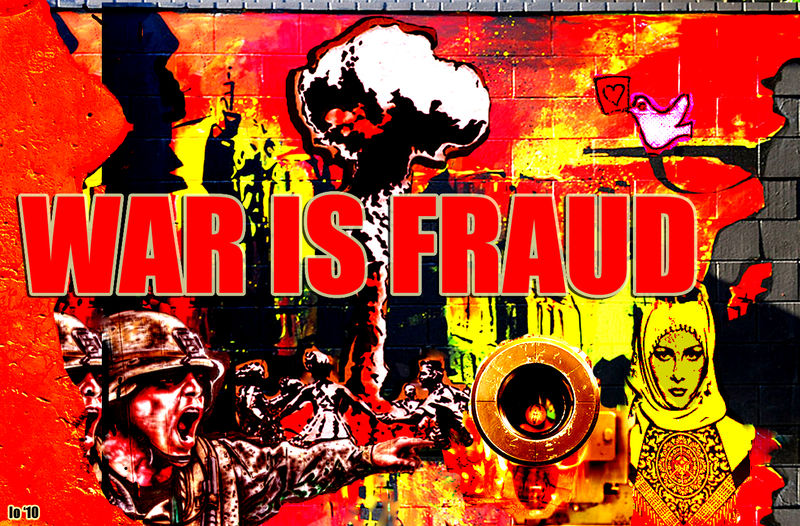WAR IS FRAUD
EnGULFed In Pathocracy: WAR IS HELL / WAR IS FRAUD
Nuclear Graffiti
The narrative we are fed about war by the state, the entertainment industry and the press is a myth. And this myth is seductive. It empowers and ennobles us. It boosts rating and sells newspapers--William Randolph Hearst owed his fortune to it. It allows us to suspend individual conscience, maybe even consciousness, for the cause. And few of us are immune. Indeed, social critics who normally excoriate the established order, and who also long for acceptance and acclaim, are some of the most susceptible. It is what led a mind as great as Freud's to back, at least at its inception, the folly of World War I. The contagion of war, of the siren call of the nation, is so strong that most cannot resist.
WAR IS HELL
War itself is venal, dirty, confusing and perhaps the most potent narcotic invented by humankind. Modern industrial warfare means that most of those who are killed never see their attackers. There is nothing glorious or gallant about it. If we saw what wounds did to bodies, how killing is far more like butchering an animal than the clean and neat Hollywood deaths on the screen, it would turn our stomachs. If we saw how war turns young people into intoxicated killers, how it gives soldiers a license to destroy not only things but other human beings, and if we saw the perverse thrill such destruction brings, we would be horrified and frightened. If we understood that combat is often a constant battle with a consuming fear we have perhaps never known, a battle that we often lose, we would find the abstract words of war--glory, honor and patriotism--not only hollow but obscene. If we saw the deep psychological scars of slaughter, the way it maims and stunts those who participate in war for the rest of their lives, we would keep our children away. Indeed, it would be hard to wage war.
For war, when we confront it truthfully, exposes the darkness within all of us. This darkness shatters the illusions many of us hold not only about the human race but about ourselves. Few of us confront our own capacity for evil, but this is especially true in wartime. And even those who engage in combat are afterward given cups from the River Lethe to forget. And with each swallow they imbibe the myth of war. For the myth makes war palatable. It gives war a logic and sanctity it does not possess. It saves us from peering into the darkest recesses of our own hearts. And this is why we like it. It is why we clamor for myth. The myth is enjoyable, and the press, as is true in every nation that goes to war, is only too happy to oblige. They dish it up and we ask for more.
War as myth begins with blind patriotism, which is always thinly veiled self-glorification. We exalt ourselves, our goodness, our decency, our humanity, and in that self-exaltation we denigrate the other. The flip side of nationalism is racism--look at the jokes we tell about the French. It feels great. War as myth allows us to suspend judgment and personal morality for the contagion of the crowd. War means we do not face death alone. We face it as a group. And death is easier to bear because of this. We jettison all the moral precepts we have about the murder of innocent civilians, including children, and dismiss atrocities of war as the regrettable cost of battle. As I write this article, hundreds of thousands of innocent people, including children and the elderly, are trapped inside the city of Basra in southern Iraq--a city I know well--without clean drinking water. Many will die. But we seem, because we imbibe the myth of war, unconcerned with the suffering of others.
Yet, at the same time, we hold up our own victims. These crowds of silent dead--our soldiers who made "the supreme sacrifice" and our innocents who were killed in the crimes against humanity that took place on 9/11--are trotted out to sanctify the cause and our employment of indiscriminate violence. To question the cause is to defile the dead. Our dead count. Their dead do not. We endow our victims, like our cause, with righteousness. And this righteousness gives us the moral justification to commit murder. It is an old story.
In wartime we feel a comradeship that, for many of us, makes us feel that for the first time we belong to the nation and the group. We are fooled into thinking that in wartime social inequalities have been obliterated. We are fooled into feeling that, because of the threat, we care about others and others care about us in new and powerful waves of emotion. We are giddy. We mistake this for friendship. It is not. Comradeship, the kind that comes to us in wartime, is about the suppression of self-awareness, self-possession. All is laid at the feet of the god of war. And the cost of this comradeship, certainly for soldiers, is self-sacrifice, self-annihilation. In wartime we become necrophiliacs.
"The first casualty when war comes," Senator Hiram Johnson said in 1917, "is truth."
The reasons for war are hidden from public view. We do not speak about the extension of American empire but democracy and ridding the world of terrorists--read "evil"--along with weapons of mass destruction. We do not speak of the huge corporate interests that stand to gain even as poor young boys from Alabama, who joined the Army because this was the only way to get health insurance and a steady job, bleed to death along the Euphrates. We do not speak of the lies that have been told to us in the past by this Administration--for example, the lie that Iraq was on the way to building a nuclear bomb. We have been rendered deaf and dumb. And when we awake, it will be too late, certainly too late to save the dead, theirs and ours.
The embedding of several hundred journalists in military units does not diminish the lie. These journalists do not have access to their own transportation. They depend on the military for everything, from food to a place to sleep. They look to the soldiers around them for protection. When they feel the fear of hostile fire, they identify and seek to protect those who protect them. They become part of the team. It is a natural reaction. I have felt it.
But in that experience, these journalists become participants in the war effort. They want to do their bit. And their bit is the dissemination of myth, the myth used to justify war and boost the morale of the soldiers and civilians. The lie in wartime is almost always the lie of omission. The blunders by our generals--whom the mythmakers always portray as heroes--along with the rank corruption and perversion, are masked from public view. The intoxication of killing, the mutilation of enemy dead, the murder of civilians and the fact that war is not about what they claim is ignored. But in wartime don't look to the press, or most of it, for truth. The press has another purpose.
Perhaps this is not conscious. I doubt the journalists filing the hollow reports from Iraq, in which there are images but rarely any content, are aware of how they are being manipulated. They, like everyone else, believe. But when they look back they will find that war is always about betrayal. It is about betrayal of the young by the old, of soldiers by politicians and of idealists by the cynical men who wield power, the ones who rarely pay the cost of war. We pay that cost. And we will pay it again.
http://www.thenation.com/doc/20030421/hedges/2


